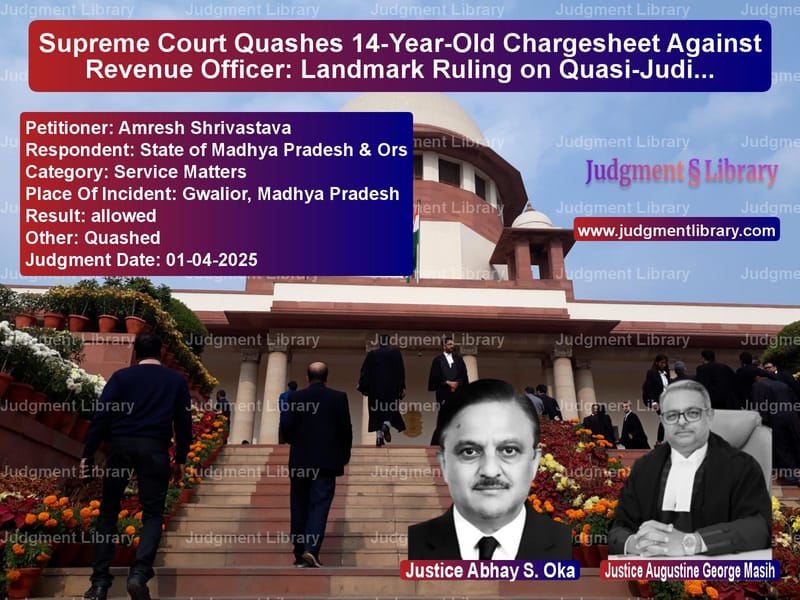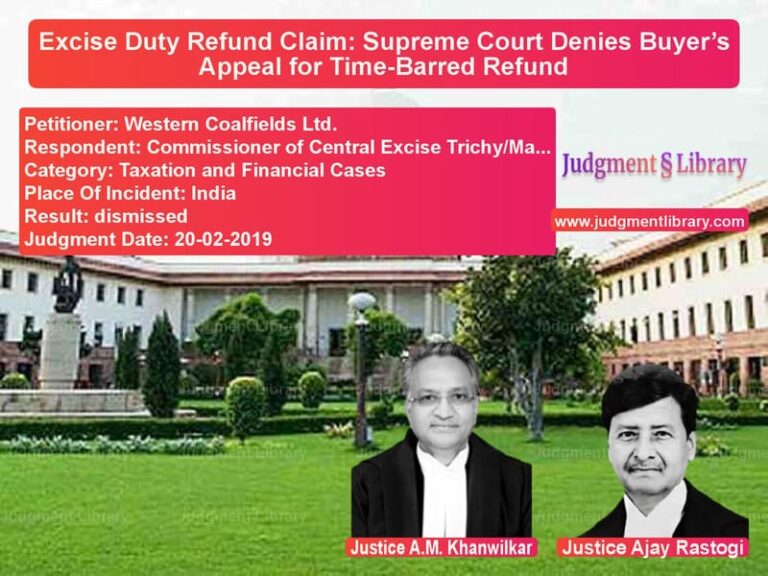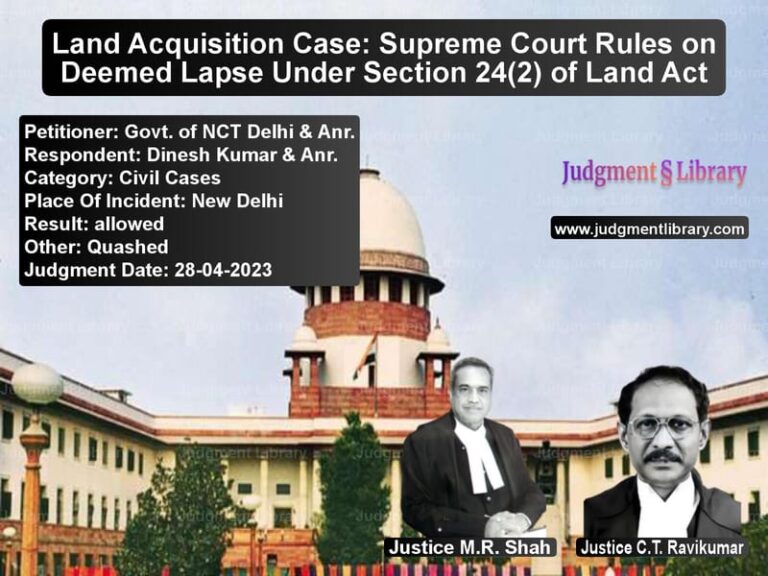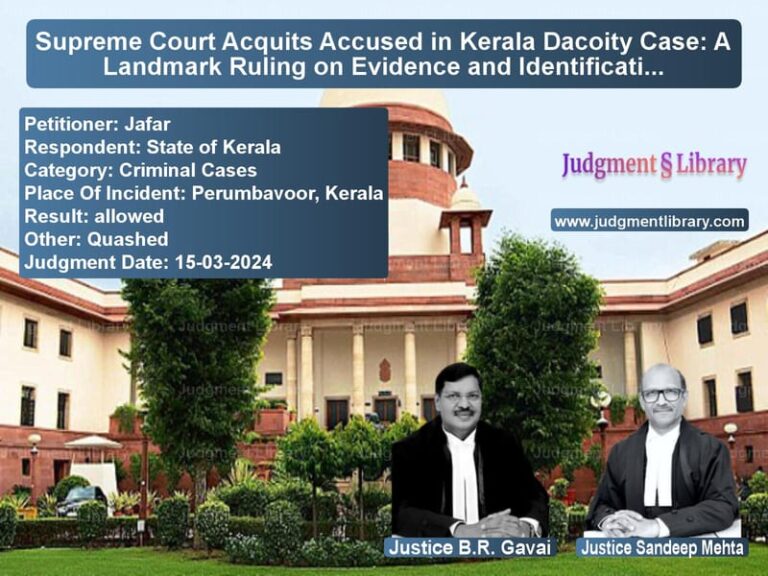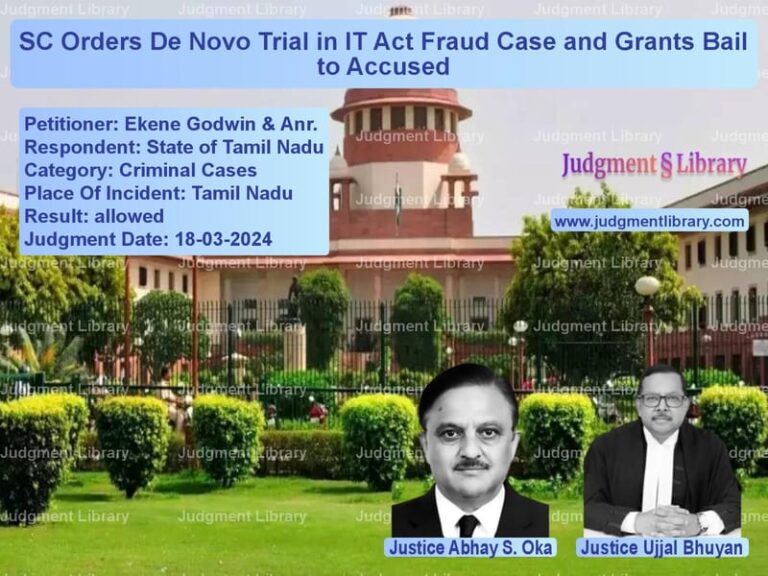Supreme Court Quashes 14-Year-Old Chargesheet Against Revenue Officer: Landmark Ruling on Quasi-Judicial Immunity and Delay in Disciplinary Proceedings
In a significant judgment delivered on April 1, 2025, the Supreme Court of India quashed a 14-year-old chargesheet against a revenue officer in Madhya Pradesh, setting crucial precedents regarding disciplinary proceedings against quasi-judicial officers and the impact of inordinate delays in initiating such proceedings. The case, Amresh Shrivastava vs State of Madhya Pradesh & Ors, involved complex questions about the protection available to government officers exercising quasi-judicial functions and the consequences of delayed disciplinary action.
Detailed Case Background
The appellant, Amresh Shrivastava, was appointed as Naib Tehsildar on June 15, 1981, and promoted to Tehsildar on December 31, 1991. Between July 1993 and September 1998, he served as Tehsildar in Gwalior district, where he performed various functions including quasi-judicial duties related to land settlement.
The case originated from a land settlement order passed by Shrivastava on June 26, 1997, regarding survey no. 1123/Min-3 in Village Barua. The order was passed after due process – notices were issued, no objections were received, and the gram panchayat passed a resolution supporting the settlement. The order attained finality as it was never challenged.
After a staggering 14-year delay, a Show Cause Notice was issued on September 21, 2009, followed by a chargesheet on April 29, 2011, alleging that the land settlement was granted illegally to ineligible persons. The chargesheet claimed this caused undue benefit to private parties and loss to the state government.
Detailed Arguments Presented
Appellant’s Comprehensive Arguments
Senior Advocate representing Shrivastava made several key submissions:
“The chargesheet issued against the Appellant would not fall within the ambit and scope of the decision in K.K. Dhawan which was relied on by the Division Bench for setting aside the order passed by the learned Single Judge. He contended that the Respondent-State’s allegations in the Show Cause Notice and ChargeSheet merely suggested that the order was wrong and not in accordance with law. There were no allegations of extraneous influence, bribery, or gratification.”
The appellant relied heavily on several precedents:
- Virendra Kumar Singh vs State of Madhya Pradesh: Where this Court ruled that departmental proceedings shouldn’t be initiated merely because a quasi-judicial order was incorrect, absent allegations of extraneous influence.
- Zunjarrao Bhikaji Nagarkar vs Union of India: Where the Court held that a quasi-judicial officer’s error in judgment doesn’t automatically imply misconduct or favoritism.
- Krishna Prasad Verma case: Where the Court clarified that wrong orders by judicial officers shouldn’t automatically lead to disciplinary action unless there are allegations of misconduct.
Regarding the delay, counsel argued:
“Counsel for the Appellant argues that the 14-year delay in issuing the chargesheet is excessive and unexplained. This significant delay supports the claim that the departmental inquiry should not continue at such a late stage… employee should not be made to suffer, which means that prompt action must be taken by the department.”
Respondent-State’s Detailed Counter-Arguments
The State of Madhya Pradesh vigorously defended the chargesheet:
“Counsel for the Respondent-State… contended that the Appellant while exercising his powers as a Tehsildar, is a Revenue Officer, and therefore a quasi-judicial officer is bound by the statute. The mandate of the statute, therefore, need to be followed and given effect, which has not been done by the Appellant. What is expected from him is to at least determine the eligibility of the person for the grant of settlement. A licence was not given to the officer to pass illegal orders in contravention to provisions of law which would indicate dishonesty.”
The State relied primarily on Union of India vs K.K. Dhawan, arguing that the case provided exceptions where disciplinary action against quasi-judicial officers was permissible. However, as noted by the Court:
“Counsel for the Respondent-State is unable to address the delay in the issuance of the chargesheet. However, he has submitted that time should not be considered a factor in such matters where departmental proceedings are initiated against an employee. He was unable to provide any material evidence suggesting extraneous considerations or influences that would place this case outside the protection afforded by the law as settled by this Court.”
Court’s Comprehensive Analysis
The Supreme Court bench comprising Justices Abhay S. Oka and Augustine George Masih conducted a thorough examination of two crucial questions:
1. Applicability of K.K. Dhawan Exceptions
The Court meticulously analyzed the exceptions carved out in K.K. Dhawan where disciplinary action against quasi-judicial officers is permissible:
“(i) Where the officer had acted in a manner as would reflect on his reputation for integrity or good faith or devotion to duty; (ii) If there is prima facie material to show recklessness or misconduct in the discharge of his duty; (iii) if he has acted in a manner which is unbecoming of a Government servant; (iv) if he had acted negligently or that he omitted the prescribed conditions which are essential for the exercise of the statutory powers; (v) if he had acted in order to unduly favour a party; (vi) if he had been actuated by corrupt motive however small the bribe may be because Lord Coke said long ago ‘though the bribe may be small, yet the fault is great.'”
The Court then applied these principles to the present case:
“In the present case, we are of the considered view that the charges alleged against the Appellant in the chargesheet fall under the category of a wrongful order, which does not appear to have been influenced by extraneous factors or any form of gratification. It appears that the order has been passed in good faith, without any indication of dishonesty. Furthermore, the facts outlined in the Show Cause Notice do not suggest any such impropriety. The power exercised by the Appellant in his capacity as a Tehsildar, while passing the order of Land Settlement Order, cannot be considered of a nature that would warrant disciplinary proceedings against him.”
2. Impact of Inordinate Delay
The Court conducted an exhaustive examination of the delay aspect:
“As to the second question, regarding whether delay is a ground for stopping the departmental proceedings at the stage of the chargesheet itself, suffice it to say that this varies from case to case. However, in the instant case where there is unexplained inordinate delay in initiating departmental proceedings despite the alleged misconduct being within the knowledge of the department, but still no departmental proceedings are initiated, the answer must go in favour of the employee.”
The Court distinguished situations where delay might be excusable:
“However, there may be cases where the department was not even aware of such irregularities or the misconduct, which is of such a nature that it is indicative, based on material considerations of factors other than merit, such as extraneous influences and gratifications. In such cases, such a delay, by itself would not be a valid ground to scuttle the initiation of the process of departmental proceedings.”
The Court relied on several precedents regarding delay:
- State of Madhya Pradesh vs Bani Singh: Where the Court upheld quashing of proceedings initiated after 12 years.
- P.V. Mahadevan vs MD, TN Housing Board: Where the Court held that continuing proceedings after undue delay would be unjust.
Court’s Final Decision and Directions
After this comprehensive analysis, the Supreme Court concluded:
“In view of the above, the present appeal is allowed and the Impugned Judgment dated 30.04.2019 passed by the Division Bench of the High Court is set aside and consequently the order dated 26.04.2017 passed by the learned Single Judge stands restored.”
The Court specifically:
- Allowed the civil appeal
- Set aside the High Court’s Division Bench judgment that had revived the chargesheet
- Restored the Single Judge’s order quashing the chargesheet
- Ordered no costs
- Disposed of any pending applications
Detailed Legal Principles Established
This judgment establishes several important legal principles:
1. Protection for Quasi-Judicial Officers
The Court reinforced the principle that quasi-judicial officers enjoy protection for decisions made in good faith:
“In cases where an order has been passed in exercise of quasi-judicial functions, the statutory remedy available against that order should be pursued unless it was passed under extraneous considerations and there is reasonable justification or material to support such a conclusion.”
2. Threshold for Disciplinary Action
The judgment clarifies that mere wrong orders don’t warrant disciplinary action without evidence of misconduct:
“Unless there are clear cut allegations of misconduct, extraneous influences, gratification of any kind etc., disciplinary proceedings should not be initiated merely on the basis that a wrong order has been passed by the judicial officer or merely on the ground that the judicial order is incorrect.”
3. Consequences of Delay
The Court established important guidelines regarding delayed proceedings:
“Continuing the departmental proceedings after an undue delay would be unjust, causing unnecessary mental distress and damaging the reputation of the employee for the mistakes committed by the department in initiating disciplinary proceedings.”
Broader Implications and Conclusion
This judgment has far-reaching implications for administrative law and service jurisprudence:
- It strengthens the independence of quasi-judicial officers by protecting them from harassment over bona fide decisions
- It imposes responsibility on departments to act promptly when misconduct is alleged
- It protects government employees from the mental agony of prolonged disciplinary proceedings
- It maintains a balance between accountability and protection for officers exercising judicial functions
The Supreme Court’s detailed reasoning and clear articulation of principles in this case provide valuable guidance for future cases involving disciplinary proceedings against quasi-judicial officers and the impact of delayed initiation of such proceedings.
Petitioner Name: Amresh Shrivastava.Respondent Name: State of Madhya Pradesh & Ors.Judgment By: Justice Abhay S. Oka, Justice Augustine George Masih.Place Of Incident: Gwalior, Madhya Pradesh.Judgment Date: 01-04-2025.
Don’t miss out on the full details! Download the complete judgment in PDF format below and gain valuable insights instantly!
Download Judgment: amresh-shrivastava-vs-state-of-madhya-prad-supreme-court-of-india-judgment-dated-01-04-2025.pdf
Directly Download Judgment: Directly download this Judgment
See all petitions in Disciplinary Proceedings
See all petitions in Public Sector Employees
See all petitions in Employment Disputes
See all petitions in Termination Cases
See all petitions in Legal Malpractice
See all petitions in Judgment by Abhay S. Oka
See all petitions in Judgment by Augustine George Masih
See all petitions in allowed
See all petitions in Quashed
See all petitions in supreme court of India judgments April 2025
See all petitions in 2025 judgments
See all posts in Service Matters Category
See all allowed petitions in Service Matters Category
See all Dismissed petitions in Service Matters Category
See all partially allowed petitions in Service Matters Category

